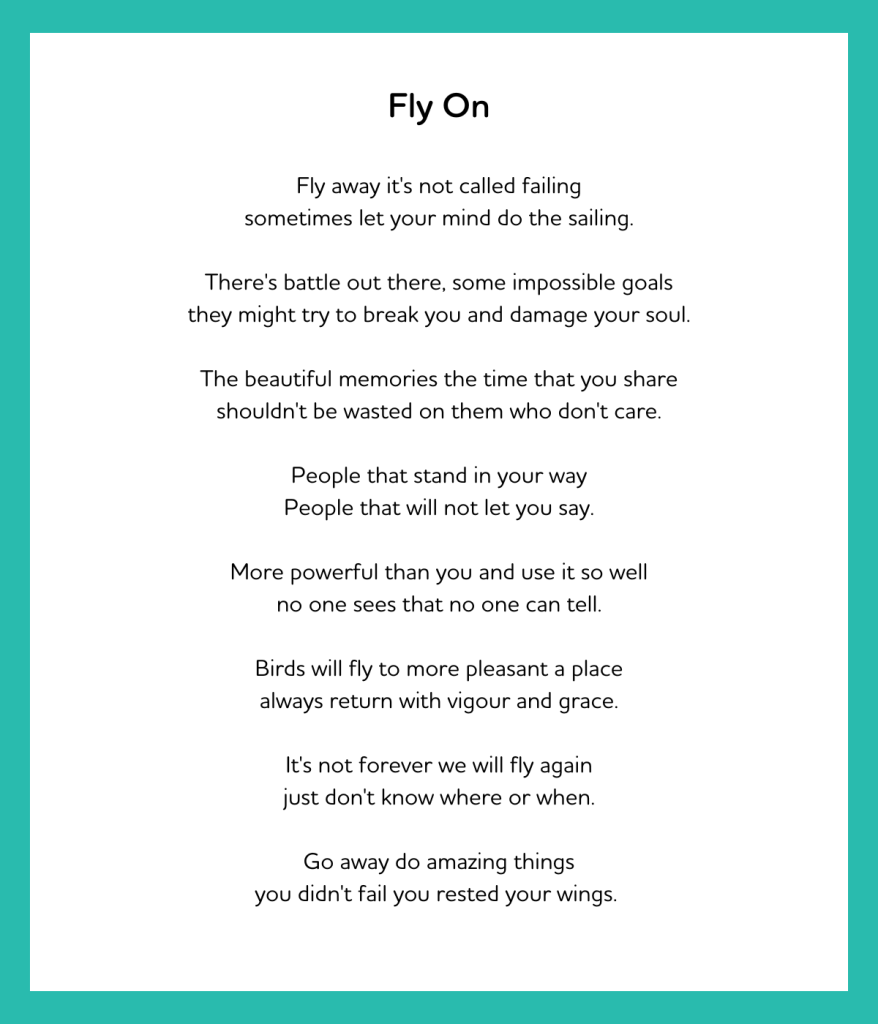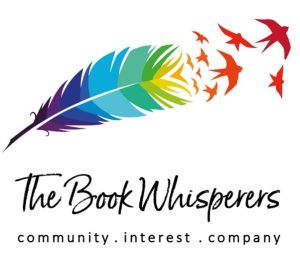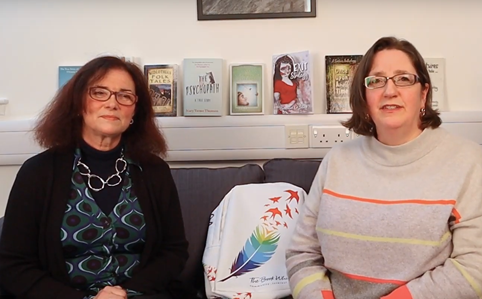Fly On, a wonderful poem written by Eileen, one of our contributors.

You can discover more creative pieces from people we support in our Arts and Crafts Winter Showcase.
The Book Whisperers are one of our Delivery Partners. They help people write books. Here, they share their top tips for writing your first book.
1. Be clear about why you want to write a book.
For example, is it for money (book sales), for your friends or family (understanding), for other people with similar life experiences (to share what you learned along the way) or something else?
Knowing what you want to achieve can help you focus. Also remember that a book does not need to be written for the public. Sometimes it can be helpful to get your thoughts down on paper, even if you never show your writing to anyone.
2. Your first draft doesn’t have to be perfect.
Writing something can take time. Have confidence in the story and allow it to come out on its own. Planning can be helpful. For example, making a timeline or chapter headings can help to keep the whole story in your mind. This also helps you to see how far you have come and how much more there is to do.
3. Get support.
For some people, it can be helpful to work with a writing coach. They can help set specific goals and deadlines. Working with an editor can help you improve the story. You could also join a writing group or writing community. Having people to talk to and support your writing journey can help you to keep going.
Find out more about The Book Whisperers in our Meet the Partner feature.


The Book Whisperers is a community of people that helps writers of all kinds to self-publish their work. We have partnered with them on several occasions to help people with assisted memoir writing or to help publish books of poetry or children’s books. We spoke to Mary Turner Thomson, one of the group’s founders and Managing Director of the social enterprise.
What gave you the idea to create The Book Whisperers?
In March 2020, when we knew we were going into lockdown, I sat down with a couple of my author friends and discussed what we could do to help our community. We figured – as authors and publishers – the thing we really could do was to help people spend the time in lockdown writing that book they had always thought of doing. So we created a website, and a free Facebook group, alongside three basic six-week courses in writing.
We put out a call to our friends saying, “If you want to write a book, now might be the time to do that, come and join us to learn how!” We thought about twenty people would join us. Within a week we had about one thousand members.
What services do you provide? How does it work?
We provide whatever the client needs to get going – whether that is brainstorming ideas, writing coaching, ghost writing, editing, layout/design, or publishing support. So it all depends on what the client needs.
So is it mostly for experienced writers?
Not at all. It’s for everyone, at any point in the journey.
How did you and Future Pathways find each other?
Future Pathways heard about what we were doing, so they came to us and said, “We’re working with someone who wants to write his life story.”
My colleague Lea Taylor – Creative Director of The Book Whisperers – worked with him. She would interview him, then write up the note, using his voice and turn of phrase to ensure authenticity. She’d then show him the notes and they’d work on them together. By the end of the process he had a completed biography in his hands.
He said: “Her way of thinking, putting words on a page, forming a sentence – helping me to express myself on all aspects of my life. I never expected this amount of help. To this day I thank my ghostwriter helper and would highly recommend anyone taking one on. Seeing the finished product in print was unbelievable. I had started a project and finished it. When I got my book, I sat down and read it. It made me cry and made me happy and it made me laugh. The combination of all these aspects of a man’s life, everything looked as if my life, all the pieces, slipped into place and at the end of these weary days I’m a very happy chappy.”

Picture above: Lea Taylor (left) and Mary Turner Thomson (right), Directors of the Book Whisperers
Have you worked with many Future Pathways people since then?
Yes, we have been very lucky to work with quite a few. Every story is different. Even if the client wants a private book for their family and friends (rather than published book for the general public) it is still a very good process to go through.
Do you think that even just the process of writing can be therapeutic?
Absolutely, in lots of ways. Writing helps with communication, self-esteem, self-confidence, concentration, life expectancy, all sorts of things. The benefits – of writing and reading – are absolutely massive, not just for mental health but physical health as well. As you can tell, I’m quite passionate about the subject!
Finally, what are your future plans for The Book Whisperers?
We want to build up the platform, and get a lot of people onto it. By doing that we will be able to source new authors who can work with us. So when people come to us and want to write any particular kind of book, we’ll have an author who specialises in that.
We also want to do writing courses for existing authors and writers, and we’re thinking about doing writing retreats. So we’ve got great plans.
Honestly, it’s my dream job. If I won the lottery, I would still carry on doing this. When you’re doing a job that you love so much you wouldn’t stop even if you become a millionaire, that’s when you know you’re doing the right thing with your life.
Interested in writing? Check out The Book Whisperers’ Top Three Tips for writing your first book.
You can find out more about the project at thebookwhispererscommunity.com.
For a full list of who we work with, visit our Delivery Partners page.
Your Five Ways to Winter Wellbeing:
A special feature from Health in Mind
It is important that we take care of our wellbeing, especially during the Winter months. Here are some ideas for winter wellbeing activities:

Connect: writing a card for someone can help you feel connected.
Good relationships are important for mental wellbeing. It is important that we make time to connect with the people who matter to us. By looking after these relationships, we feel happier and more secure, giving a better sense of purpose. Ways to connect with others include:
- Set up a group chat with friends or to plan winter activities
- Write a card to someone you have not spoken to in a while
- Make a playlist for someone in your life and chat about it together
- Reduce your screen time when you are with other people. Put the phone away, close your laptop, turn off the TV and have a chat

Get active: getting outdoors can improve your mood.
You should try to do something active every day, even if it is cold and dark outside. A walk every day can give your body a boost, lift your mood and make everyday activities easier. Other ways to keep active this winter include:
- Doing stretches or gentle movement that works for you
- If you can, getting outside every day – even for just 5 minutes
- Going for a walk in your local area

Take notice: taking up a mindful hobby can improve your wellbeing.
We can improve our mental wellbeing by paying attention to the present moment – to our own thoughts and feelings and to the world around us. This is sometimes called mindfulness. Here are just a few ways you can pay attention to the present moment this winter:
- Take notice of the seasons changing and how it impacts the things around you
- Buy an amaryllis bulb and watch it grow over the winter months
- Take up a mindful indoor hobby like journaling or knitting

Keep learning: learning new things, like trying a new recipe,
can help our mental wellbeing.
Learning new things is useful. It can also improve our mental wellbeing. Learning means different things to everyone. This could mean studying for a new qualification or learning a new recipe in the kitchen.
- Try out a new winter recipe
- Listen to a podcast or audiobook about a topic you do not know about
- Try a new DIY project you have been wanting to do
- Ask questions and learn from the people around you

Give: shopping locally supports small business in your local community.
From small acts of kindness to volunteering, giving can give you a sense of purpose, community and connection. Ways you can give back this winter include the following:
- Trying to shop locally so you can help small businesses
- Donating or volunteer your time to a cause in your community
- Raising awareness of causes on social media by sharing posts about issues that are important to you
The above feature was adapted from Coorie In, a special winter publication from Health in Mind. You can read and download the full version here.
Health in Mind are one of the partners of the In Care Survivors Alliance. They are a charity that promote positive mental health and wellbeing in Scotland. Find out more about their work and the services they offer at health-in-mind.org.uk

